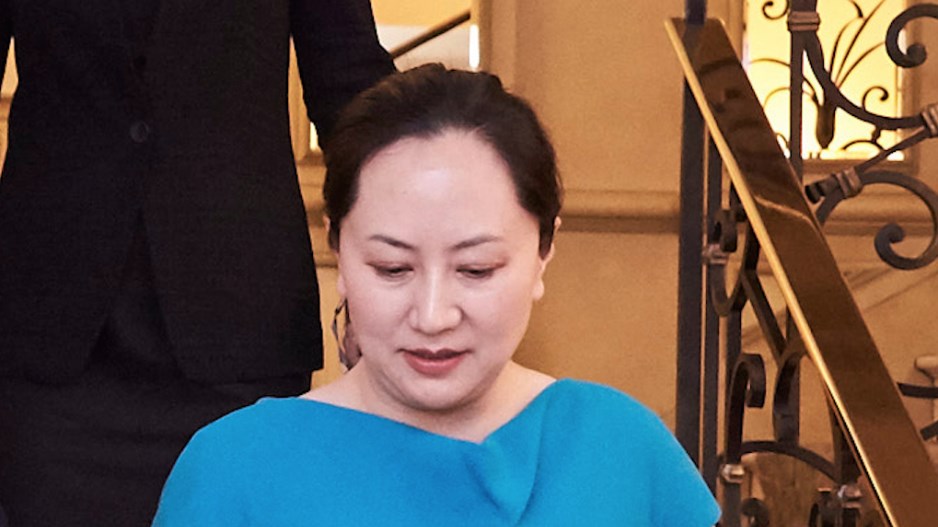In her return to BC Supreme Court this morning, Huawei Technologies Co. Ltd. CFO Meng Wanzhou and her defence team targetted the coordination between the arresting Canadian authorities in conducting a “covert criminal investigation” that violated Meng's charter rights.
As Meng's extradition hearing proceedings resumed this week, defence lawyer Richard Peck formally applied for disclosure of documents and information surrounding the YVR detention, since “it violated charter rights” and “gave the CBSA opportunity to interrogate” Meng in in the pretext of an admission process to Canada.
The defence’s submissions focused on - among other items - a meeting held by CBSA and RCMP officials at Vancouver International Airport at 9:30 a.m. on December 1, 2018, which is the date of Meng's arrest (upon her arrival on a Cathay Pacific flight from Hong Kong). Peck says the meeting - which the defence contends was omitted in a few records of what happened that day at YVR - was a central factor in Canadian authorities changing the plan from arresting Meng on the plane immediately upon arrival to a detention at the gate.
Among the defence’s submissions is also the Canadian arrest warrant issued for Meng on Nov. 30, which said authorities “are hereby commanded to immediately arrest Wanzhou Meng and to bring her before a judge within 24 hours of the arrest...”
“The key words are, ‘to immediately arrest,’” Peck said, arguing that the immediate arrest is a mandatory part of what makes Meng’s arrest warrant valid.
The RCMP at one point considered going on the plane to arrest Meng – a point discussed among the police and CBSA in email submissions by the defence, Peck said. However, Peck noted that further email submissions showed the arresting authorities changing the plan after the 9:30 meeting opting for detention.
“What we learned very quickly afterwards was that the plan was changed,” Peck said, adding that the language of submissions appears to indicate something that overrides the procedure outlined in the warrant.
Overall, Meng's defence focused its efforts on Day 1 on painting a picture of the CBSA, RCMP and American authorities requesting extradition (the Federal Bureau of Investigation and the U.S. Department of Justice) working closely together in a web of e-mails and correspondences to confirm Meng's itinerary on the Cathay Pacific flight, to sort out the arresting procedure and to highlight the items from Meng that the authorities needed to seize.
Peck and Meng’s defence have presented a number of emails between the CBSA, RCMP and the FBI on the day prior to Meng’s arrest. The emails, Peck said, discussed the availability of the warrant, the confirmation that Meng was on the flight, the clothing she was wearing (for identification purposes) and the fact that the officers making the arrest should seize only the electronic devices - and not normal luggage - from Meng.
The defence also showed a short video of Meng during her detention at YVR dealing with CBSA officers while an RCMP officer came into the screen, spoke with a CBSA agent, then left. Peck said this video showed that the RCMP showed no immediacy in presenting Meng with the warrant and "stood by and watched her be interrogated by the CBSA" despite the fact the actions of the arresting officials - who placed Meng's electronic devices in a signal-proof bag “per FBI request" - essentially corresponding to that of a criminal investigation rather than a border-entry check.
“The bag leaves no doubt to what this is,” Peck said. “And it wasn’t under the process of arrest ... it’s some other procedure that’s doing this.”Peck said that the arresting authorities showed did not immediately present Meng with her arrest warrant and remind her of her charter rights, but instead “stood by and watched her be interrogated by the CBSA.”
Meng’s defence team will formally apply to stay the extradition proceedings requested by the United States. Earlier documents indicate her lawyers will focus on Canadian authorities’ evidence collected during a three-hour detention at YVR in Dec. 1 prior to being formally arrested.
The defence also will argue abuse of process – that the U.S. is pursuing the case as part of its trade negotiations with China. American authorities accuse Meng and Huawei of violating trade sanctions with Iran and stealing trade secrets from companies in the U.S.
“The United States has a history of misusing immigration law to investigate parties like Huawei,” Peck said, pointing to a court-filed affidavit from a former company employee who reported having his laptop seized or searched whenever he entered or exited the U.S. between 2013 to 2018.
Meng, dressed in a purple dress and surrounded by family, lawyers and security, appeared relaxed in conversation with others in her party during a short break in proceedings this morning.
The proceedings will resume Tuesday.




